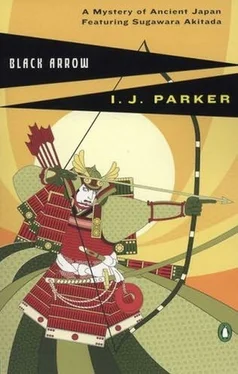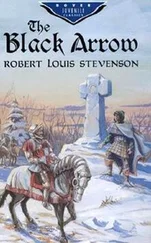I. Parker - Black Arrow
Здесь есть возможность читать онлайн «I. Parker - Black Arrow» весь текст электронной книги совершенно бесплатно (целиком полную версию без сокращений). В некоторых случаях можно слушать аудио, скачать через торрент в формате fb2 и присутствует краткое содержание. Год выпуска: 2006, ISBN: 2006, Издательство: Penguin, Жанр: Исторический детектив, на английском языке. Описание произведения, (предисловие) а так же отзывы посетителей доступны на портале библиотеки ЛибКат.
- Название:Black Arrow
- Автор:
- Издательство:Penguin
- Жанр:
- Год:2006
- ISBN:9780143035619
- Рейтинг книги:5 / 5. Голосов: 1
-
Избранное:Добавить в избранное
- Отзывы:
-
Ваша оценка:
- 100
- 1
- 2
- 3
- 4
- 5
Black Arrow: краткое содержание, описание и аннотация
Предлагаем к чтению аннотацию, описание, краткое содержание или предисловие (зависит от того, что написал сам автор книги «Black Arrow»). Если вы не нашли необходимую информацию о книге — напишите в комментариях, мы постараемся отыскать её.
Black Arrow — читать онлайн бесплатно полную книгу (весь текст) целиком
Ниже представлен текст книги, разбитый по страницам. Система сохранения места последней прочитанной страницы, позволяет с удобством читать онлайн бесплатно книгу «Black Arrow», без необходимости каждый раз заново искать на чём Вы остановились. Поставьте закладку, и сможете в любой момент перейти на страницу, на которой закончили чтение.
Интервал:
Закладка:
Akitada said peevishly, “I wish you wouldn’t bother! These border warlords are hardly going to be impressed by a perfumed gown.”
Tamako gave him a searching glance and said, “I think you do Uesugi an injustice. The family has money and they have for generations sent their sons to the capital to be educated.” After a moment she added, “I hope there is no reason to suspect them of disloyalty. Perhaps you should postpone this visit.”
Akitada growled, “Nonsense,” and went to a cushion near a brazier full of glowing charcoal.
Lowering his tall frame gingerly, he watched his wife’s graceful movements as she placed the censer under the bamboo stand and used her fan to direct the scent of incense toward the garment. He held his chilled fingers over the glowing coals. “It is clouding up,” he said, his heavy eyebrows glowering. “The chances are excellent that I will get a good soaking on the way. The very idea, wearing a perfumed silk robe for a ten-mile ride across rough roads in this kind of weather.”
“You can put your straw raincoat over it. Or better still, why don’t you let Tora take your regrets and stay here with me?”
She laid down her fan, came to him and knelt, placing a cool hand against his forehead. “At least you are not feverish,” she said. “Are you still feeling ill?”
Akitada shifted away irritably. “It is nothing.”
He thought: And I must go. Unless I can get Uesugi to support me, I am wasted here. He clenched his fists. In the week since his arrival he had met with sullen stares from the people in the streets, and with lack of cooperation and outright insubordination from what passed as his staff at the tribunal. Not that there was much of it, for the entire paperwork of the province seemed to be in the hands of one senior clerk and two frightened youngsters. And in the jail and constabulary matters were even worse. Never had he seen a more depraved looking gang of cutthroats than his tribunal constables and their brutish sergeant, while the few prisoners in their filthy cells looked starved and bore the marks of cruel beatings.
To add insult to injury, the provincial guard, commanded by the haughty Captain Takesuke, seemed to take its orders from Takata. The old Lord Uesugi was the provincial high constable. Evidently his authority also extended to legal matters, for since Akitada’s arrival not a single man or woman had come to the tribunal to lay charges or ask for adjudication of a case. He sighed deeply.
“What is wrong?” his wife asked.
“It may be,” he said heavily, “that we should not have come here. Nothing has gone right. The tribunal is practically a ruin, the provincial granaries are almost empty, and the people are sullen to the point of disrespect. We have yet to receive a single welcome.”
She got up to return to her work. “It is true that this is a strange place, but you were eager to leave the capital. Remember how unhappy you were with your work and how cruelly the minister used you? If only winter were not so near.” Her voice trailed off uncertainly.
Akitada was suddenly ashamed of having taken out his ill humor on his wife. “Tamako, are you sorry you came?” he asked anxiously. “This is called the snow country, you know. They say we will be snowed in for six months and rarely see daylight because the snow covers the whole house. And we don’t even have a house. How will you pass your time?”
She gave him a smile. “We can make this place livable and we will be together.”
Akitada looked about at the handsome screens and movable hangings and at the large lacquer chests holding their bedding and clothes. But he was worried about other matters. “There are no women’s quarters here. And the men are not only hostile and rebellious, but uncouth. Your maid may be raped within a week. I should never have brought either of you.”
There was a brief silence. Then Tamako said in a brittle voice, “If you don’t want me here, I will go back. Then at least I shall be of some use to your mother and sisters.’“
They both knew they were too far from the capital and he could not send her home, but he refused to acknowledge his defeat. Instead he changed the subject. “Today there were more dispatches from the north. The Ezo have attacked on several fronts, and our troops are fighting as far south as Tagajo. It made me wonder why the younger Uesugi does not join them. After all, their local reputation rests solely on their military ability to protect this province.”
“I expect the old lord is worse. The women in the kitchen say he cannot last much longer. Do you think the Ezo will push as far south as this?”
“No. Our soldiers are staunch fighters. Besides, the snow will make the roads impassable. No doubt that is the reason for all the unrest. The Ezo are trying to improve their positions before retiring into their winter camps.”
There was a scratching sound at the door and it slid open. A soberly dressed elderly man with a thin white mustache and chin beard entered and bowed.
Tamako cried, “Seimei, I am very glad to see you. Your master insists on riding to Takata tonight in spite of his indisposition. Can you make him one of your soothing teas?”
“Gladly.” The old man looked up eagerly. “But your ladyship flatters my poor skills. Are you still nauseated, sir?” He came closer and studied Akitada’s face. “Is there a bloated feeling in your belly? Or angry dragon sounds in the bowels? What about your stool? Any sign of flux? Or flatulence?”
Akitada growled, “For heaven’s sake, leave me alone, both of you! No, Seimei, I don’t want any tea.” He got up. “Tamako, you can send for me when you are done. I need some fresh air and will be on the veranda!” He stalked from the room.
The tribunal hall was raised several feet above ground. In warmer climes arid in the summer months this construction assured cooling air circulation, but here it meant that the icy air seeped mercilessly through the wooden floors. Akitada walked along the veranda under the deep eaves and looked across the open courtyard toward the smaller outbuildings that served as the kitchen, storehouse, stable, constabulary, and jail. All of it looked depressingly derelict.
A cold gust of air tore at his robe and flapped one of his wide sleeves into his face. He shivered, but breathed in deeply, trying to settle his stomach. Dusk would be early because of the weather. Stepping to the railing, Akitada glanced up at ominous clouds scurrying across a leaden sky. The wind rushed through the bare trees in the courtyard, sweeping before it red and brown leaves. Some danced across the wooden boards under his feet and gathered in drifts against the walls of the building. Beyond the tribunal palisade stretched more bare trees and dark thatched roofs. Somewhere in the gray distance lay the ocean. Akitada turned a corner and looked at the mountains, which already wore white patches of snow. Winter came early in Echigo.
When he and Tamako had traveled north, the woods had reminded them of pieces of brocade, the maple leaves weaving glowing designs against the deep green of the pines. They had taken their meals by the side of the road, and remarked on the beauty of the country.
But then the weather had turned dismal and the winds bitterly cold. No wonder Echigo was a place where the emperors used to send their political enemies. And now they had sent him and Tamako to this godforsaken place.
Akitada closed his eyes against the dreary grayness, stubbornly blocking such thoughts from his mind. It was this confounded bellyache. At his age, being appointed deputy governor, even if it was just a provisional appointment with limited powers and even more limited salary, was an extraordinary piece of luck. Here he could make a name for himself and prove his worth.
Читать дальшеИнтервал:
Закладка:
Похожие книги на «Black Arrow»
Представляем Вашему вниманию похожие книги на «Black Arrow» списком для выбора. Мы отобрали схожую по названию и смыслу литературу в надежде предоставить читателям больше вариантов отыскать новые, интересные, ещё непрочитанные произведения.
Обсуждение, отзывы о книге «Black Arrow» и просто собственные мнения читателей. Оставьте ваши комментарии, напишите, что Вы думаете о произведении, его смысле или главных героях. Укажите что конкретно понравилось, а что нет, и почему Вы так считаете.












